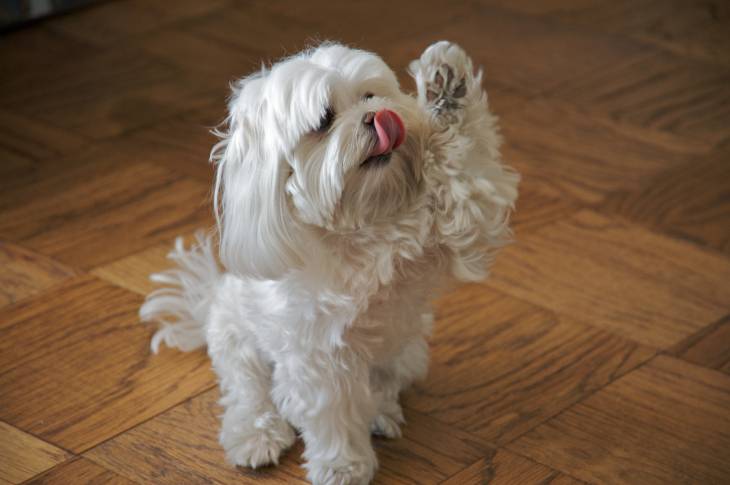A Look at the Lick: Do Dogs Clean Themselves?
We have all seen our dog taking his tongue to various parts of his body. While we try not to think about it when he licks us, we may just think that he’s giving himself a tongue bath much like a cat would. But is this an accurate assumption?
There May be a Self-Grooming Element Happening
Dogs aren’t neat freaks like cats, but they can use their tongues for a little self-grooming from time to time. It's not the main reason your dog will lick himself, and it certainly doesn't take you off the hook from giving him a bath. But if you notice that your dog isn't making too much of a habit slathering his body (and especially certain parts of his body) with his tongue, chances are he's doing a little cleaning up.
There are times when a dog’s lick represents a different type of cleaning - specifically, wound cleaning. A dog’s saliva contains certain enzymes that can help expedite the healing process in a cut or an open wound. What’s more, the spit will provide your pooch with an anesthetic affect that lasts until it evaporates.
When Licking Becomes a Problem
If you observe your dog licking a lot, it’s not because he’s suddenly over-concerned about his appearance. There could be a wide range of issues that are going on with your pooch, from allergies and parasites to dry skin and excessive anxiety. If the licking becomes obsessive, it could end up creating adverse consequences for your four-legged friend.
Your Dog May be Trying to Tell you Something With His Licking
Dogs have a tendency to lick at a spot when they are in pain. You may think this is a rather obvious observation if you catch him licking a cut or an open wound since a pooch's saliva can help out with the overall healing process. However, it should be noted that a dog's licking behavior also correlates with injuries that are unseen.
If you notice that your dog is persistently licking on a spot that has not wound to clean, you should check for other, more subtle indicators of pain around the area. Signs like bruises or swelling are typical indications that something painful is lurking below the surface of the skin. If you suspect there may be something afoot, schedule an appointment with your vet as soon as possible.
How do I Get My Dog to Stop Licking Himself?

There is no universal solution to get your pooch to cease with the excessive licking. It is on a case by case basis, with the path of treatment largely contingent on the reason why your pooch is giving himself tongue lashings in the first place. The treatments themselves can be simple or complex, depending on the root of the issue.
In some cases, it may be determined that your dog’s constant licking is a by-product of an allergy. If so, your vet may recommend the use of topical antibiotics to help resolve the issue. A change in your dog’s diet may also be recommended, as it’s not unheard of for a dog to develop an allergy to his own food.
A change in your dog’s routine and habits may also be recommended if your dog’s excessive licking is determined to be an emotional or psychological response. Implementing a regular exercise routine will stimulate your dog’s brain, keep his disposition in a good spot, and help him release energy in a positive, non-destructive manner. Providing your dog will mentally stimulating activities such as giving him a puzzle with treats inside will also help him stave off boredom without resorting to applying his tongue to his body.
Don’t Be Conservative When it Comes to Your Dog’s Self-Licking Habits
If you notice even a slight uptick in your dog’s self-licking tendencies, don’t just assume that’s trying to be extra clean. Be sure to examine your pooch as well as you can, and don’t be gun-shy about elevating things with a trip to your local vet. Remember, doing a little preventative maintenance and a little leg work can go a long way in helping your four-legged friend remain as healthy and happy as he possibly can.

